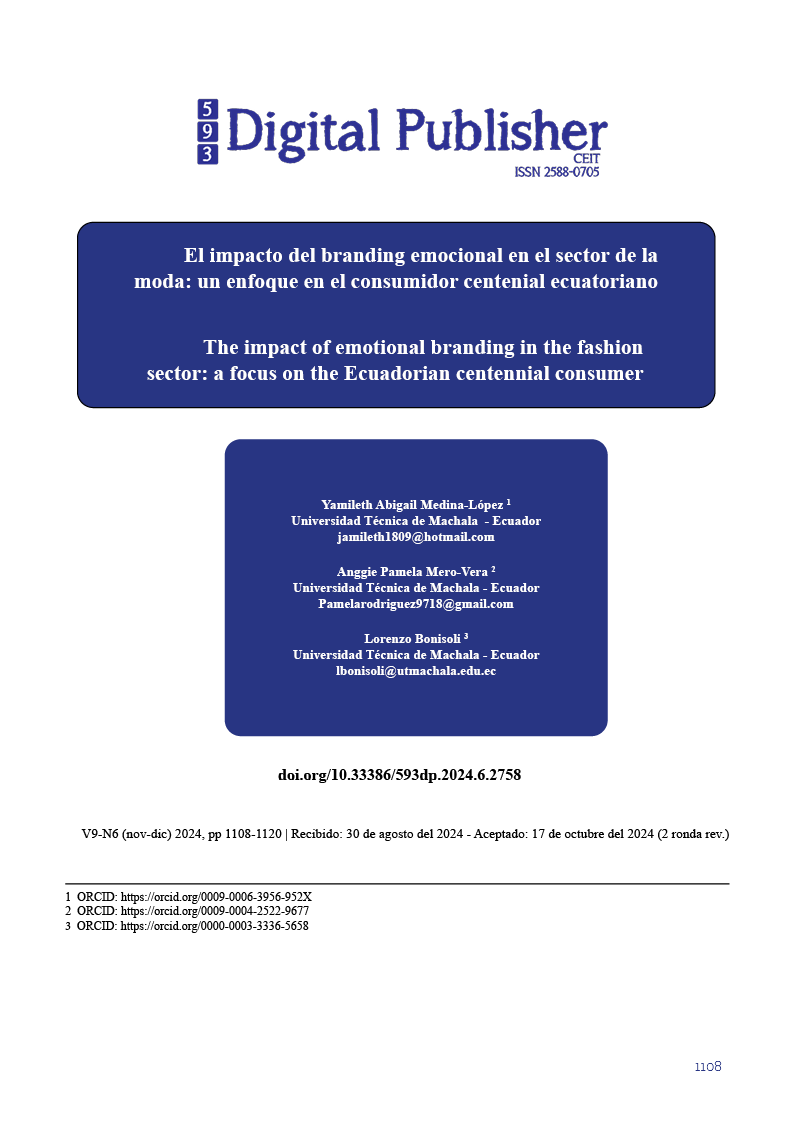The impact of emotional branding in the fashion sector: a focus on the Ecuadorian centennial consumer
Main Article Content
Abstract
The importance of brands lies in their ability to establish emotional connections with consumers, therefore, fashion studies address relevant aspects such as gender, class and culture, highlighting that fashion transcends simple clothing and reflects social changes. This study investigates the relationship between various variables; as well as Brand Experience, Brand Trust, Brand Authenticity, Brand Attachment, Brand Loyalty and Brand Equity in the context of the Ecuadorian centennial consumer, seeking to identify which variable has the greatest impact on brand loyalty and perception in relation to the approach that the Ecuadorian centennial consumer has. Consequently, this research has an empirical study, a quantitative approach and in turn its scope of exploratory nature and in turn the technique to be used will be the analysis of SEM-PLS results (structural equation models) in order to determine how many variables positively influence the model to be studied.
Downloads
Article Details

This work is licensed under a Creative Commons Attribution-NonCommercial-ShareAlike 4.0 International License.
1. Derechos de autor
Las obras que se publican en 593 Digital Publisher CEIT están sujetas a los siguientes términos:
1.1. 593 Digital Publisher CEIT, conserva los derechos patrimoniales (copyright) de las obras publicadas, favorece y permite la reutilización de las mismas bajo la licencia Licencia Creative Commons 4.0 de Reconocimiento-NoComercial-CompartirIgual 4.0, por lo cual se pueden copiar, usar, difundir, transmitir y exponer públicamente, siempre que:
1.1.a. Se cite la autoría y fuente original de su publicación (revista, editorial, URL).
1.1.b. No se usen para fines comerciales u onerosos.
1.1.c. Se mencione la existencia y especificaciones de esta licencia de uso.
References
Ali, H., y Alqudah, O. (2021). The effects of influencer marketing on overall brand equity through brand awareness and customer brand engagement. International Journal of Data and Network Science , 6(3), 651-658. https://doi.org/10.5267/j.ijdns.2022.4.007
Almohaimmeed, B. (2020). THE IMPACTS OF BRAND EXPERIENCES ON CUSTOMER SATISFACTION AND ELECTRONIC WORD OF MOUTH. Business: Theory and Practice, 21(2), 695-703. https://doi.org/10.3846/btp.2020.11965
Amer, S., Elshimy, A., y Mohamed, M. (2023). The role of brand experience on brand equity: Mediating effect of authenticity in new luxury fashion brands. Cogent Business y Management, 10(3), 1-22. https://doi.org/10.1080/23311975.2023.2285026
Arbaiza, F., y Huertas, S. (2018). Comunicación publicitaria en la industria de la moda: branded content, el caso de los fashion films. Revista de Comunicación , 17(1), 9-35. https://doi.org/10.26441/RC17.1-2018-A1
Bernal, C. (2016). Metodología de la Investigación Cuarta Edición . PEARSON.
Bian, X., y Haque, S. (2020). Counterfeit versus original patronage: Do emotional brand attachment, brand involvement, and past experience matter? Journal of Brand Managament, 27, 438-451.
Cavazos, J., Máynez, A., y Vargas, M. (2024). Satisfacción con la compra de ropa en línea: análisis de sus antecedentes. Retos Revista de Ciencias de la Administración y Economía, 14(27), 35-50. https://doi.org/10.17163/ret.n27.2024.03
Corona, L., y Fonseca, M. (2023). Las hipótesis en el proyecto de investigación: ¿cuándo si, cuándo no? Medisur, 21(1), 269-273.
Cronbach, L. (1951). Coefficient alpha and the internal structure of tests. Psychometrika, 297-334. https://doi.org/doi.org/10.1007/BF02310555
Dijkstra, T., y Henseler, J. (2015). Consistent partial least squares path modeling. Mis Quaterly, 39(2), 297-316. https://doi.org/10.25300/MISQ/2015/39.2.02
Fetais, A., Algharabat, R., Aljafari, A., y Rana, N. (2023). Do Social Media Marketing Activities Improve Brand Loyalty? An Empirical Study on Luxury Fashion Brands . Information Systems Frontiers(25), 795-817. https://doi.org/10.1007/s10796-022-10264-7
García, M. (2023). Identidad y gestión de cambio en la industria de la moda. Revista panamericana de comunicación , 5(1), 99-106.
Gómez, M., y Veloso, M. (2020). Brand experience and brand attachment as drivers of WOM in hospitality. Spanish Journal of Marketing, 24(2), 231-246. https://doi.org/10.1108/SJME-12-2019-0106
Haudi, Handayani, W., Musnaini, Totok, Y., Prasetio, T., Pitaloka, E., . . . Cahyono, Y. (2022). The effect of social media marketing on brand trust, brand equity and brand loyalty . International Journal of Data and Network Science, 6(3), 961-972. https://doi.org/10.5267/j.ijdns.2022.1.015
Jasso, F., Gudiño, S., y Tamez, J. (2019). Centennials, ciudadanos globales y digitales. Praxis, 15(1), 11-23.
Jöreskog. (1971). Statistical analysis of sets of congeneric tests. Psychometrika(36), 109-133. https://doi.org/10.1007/BF02291393
Limaymanta, C. (2019). Tendencias de diseños metodológicos en las publicaciones indexadas sobre la satisfacción laboral del profesorado universitario. Revista Electrónica Educare, 23(3), 1-23. https://doi.org/10.15359/ree.23-3.6
Lin, F.-L., y Ku, T.-H. (2023). Effect of digital brand experience on luxury fashion brand authenticity, attachment and loyalty. South African Journal of Business Management , 54(1), 1-8. https://doi.org/10.4102/sajbm.v54i1.3583
López, B., Vilalta, J., Vaquero, C., y Vilalta, G. (2017). Técnicas estadísticas en una alternativa de apoyo a la toma de decisiones con muestras pequeñas: Una contribución basada en Bootstrap. DYNA, 84(203), 316-321. https://doi.org/10.15446/dyna.v84n203.60910
López, C., Sotelo, J., Muñoz, I., y López, N. (2024). Análisis de la multidimensionalidad del brand equity para el sector bancario: un estudio en la generación Z. Retos. Revista de Ciencias de la Administración y Economía, 14(27), 9-20. https://doi.org/10.17163/ret.n27.2024.01
Macías, W., Barquet, G., y Yambay, J. (2024). Valor de marca y decisión de compra de bienes de consumo de rápido movimiento. Tec Empresarial, 18(2), 97-114. https://doi.org/10.18845/te.v18i2.7142
Majeed, M., Owusu, M., y Ansere, A. (2021). The influence of social media on purchase intention: The mediating role of brand equity. Cogent business y management, 8, 1-19. https://doi.org/10.1080/23311975.2021.1944008
Martínez, J., y Martínez, L. (2009). Discriminant Validity as a Scale Evaluation Criterion Theory or Statistics? Universitas Psychologica, 8(1), 27-36. http://www.scielo.org.co/pdf/rups/v8n1/v8n1a2.pdf
Motta, M. (2021). Brand experience manual: bridging the gap between brand strategy and customer experience. Review of Managerial Science, 15, 1173-1204. https://doi.org/10.1007/s11846-020-00399-9
Ortiz, M., y Fernández, M. (2018). Modelo de Ecuaciones Estructurales: Una guía para ciencias médicas y ciencias de la salud. Terapia Pscicológica, 36(1), 47-53. https://doi.org/10.4067/s0718-48082017000300047
Pacheco, P. (2021). La importancia de los medios digitales para el posicionamiento de una marca de moda en Facebook e Instagram. Revista ComHumanitas, 12(1), 19-31. https://doi.org/10.31207/rch.v12il.293
Pedroni, M., y Pérez, C. (2019). Investigación en moda: cambio, comunicación e industria [Editorial]. Prisma Social: Revista de investigacion social(24), 1-8.
Prentice, C., Correia, S., y Guerreiro, J. (2023). Engaging with intelligent voice assistants for wellbeing and brand attachment. Journal of Brand Management, 30, 449-460.
Puspaningrum, A. (2020). Social Media Marketing and Brand Loyalty: The Role of Brand Trust. Journal of Asian Finance, 7(12), 951-958. https://doi.org/10.13106/jafeb.2020.vol7.no12.951
Ríos, D. (2022). La influencia de la confianza y valor en la lealtad de la marca en estudiates de instituciones privadas de educación superior. Perspectivas(49), 9-34.
Robertson, J., Botha, E., Ferreira, C., y Pitt, L. (2022). How deep is your love? The brand love-loyalty matrix in consumer-brand relationships. Journal of Business Research, 149, 651-662. https://doi.org/10.1016/j.jbusres.2022.05.058
Rodríguez, A., y Pérez, A. (2017). Métodos científicos de indagación y de construcción del conocimiento. Revista Escuela de Administración de Negocios(82), 1-26.
Rudi, C. (2021). Emprender en el Mundo de la Moda. Cuadernos del Centro de Estudios en Diseño y Comunicación. Ensayos, 189-199. https://doi.org/10.18682/cdc.vi100.3996
Sánchez, F. (2019). Fundamentos epistémicos de la investigación cualitativa y cuantitativa: Consensos y disensos. Revista Digital de Investigación en Docencia Universitaria , 13(1), 103-122. https://doi.org/10.19083/ridu.2019.644
Silva, I., y Prestes, J. (2023). El modelo de producción fast fashion desde la perspectiva de la sostenibilidad. Veredas do Direito, 20, 3-16. https://doi.org/10.18623/rvd.v20.2414-esp
Sodergren, J. (2021). Brand authenticity: 25 Years of research. International Journal of Consumer Studies, 45(4), 645-663. https://doi.org/10.1111/ijcs.12651
Sumarmi, S., y Hety, W. (2023). Brand Experience and Brand Loyalty: Mediated by Brand Trust. Journal Ilmiah Manajemen dan Binis, 9(3), 384-392. https://doi.org/10.22441/jimb.v9i3.16060
Tran, V., Linh, T., y Dinh, T. (2020). The Relationship between Brand Authenticity, Brand Equity and Customer Satisfaction. Journal of Asia Finance, 7(4), 213-221. https://doi.org/10.13106/jafeb.2020.vol7.no4.213




